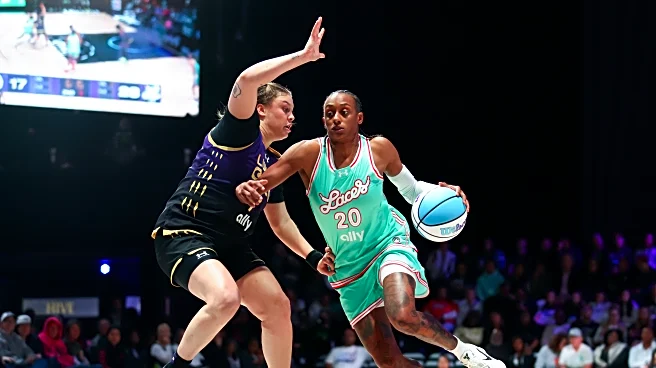What's Happening?
The San Jose Sharks have announced the appointment of five alternate captains for the 2025-26 NHL season. This decision is part of the team's leadership strategy to enhance team dynamics and performance. The announcement was made during a media availability session, where Brodie Brazil provided insights into the selection process and the roles these alternate captains will play. The appointment of multiple alternate captains is intended to distribute leadership responsibilities and foster a collaborative environment within the team. This move reflects the Sharks' commitment to building a strong leadership core to guide the team through the upcoming season.
Why It's Important?
The appointment of five alternate captains by the San Jose Sharks is a strategic move aimed at strengthening team leadership and cohesion. By distributing leadership roles among multiple players, the Sharks are fostering a sense of shared responsibility and collaboration. This approach can enhance team morale and performance, as players are encouraged to take on leadership roles and contribute to the team's success. The decision may also impact the team's dynamics, as players adjust to their new roles and responsibilities. This leadership strategy could be crucial in navigating the challenges of the NHL season and achieving competitive success.
What's Next?
The San Jose Sharks will begin the 2025-26 season with their newly appointed alternate captains, who will play a pivotal role in guiding the team. The effectiveness of this leadership strategy will be closely monitored by fans and analysts, as the team aims to improve its performance and standings in the league. The alternate captains will be expected to lead by example, both on and off the ice, and contribute to the team's overall success. The Sharks' management will continue to evaluate the impact of this decision and make adjustments as necessary to optimize team performance.
Beyond the Headlines
The Sharks' decision to appoint multiple alternate captains highlights the evolving nature of leadership in professional sports. It reflects a shift towards more collaborative and inclusive leadership models, which can enhance team dynamics and performance. This approach may influence other teams in the league to consider similar strategies, as they seek to build strong leadership cores. The decision also underscores the importance of adaptability and innovation in sports management, as teams strive to remain competitive in a rapidly changing environment.









